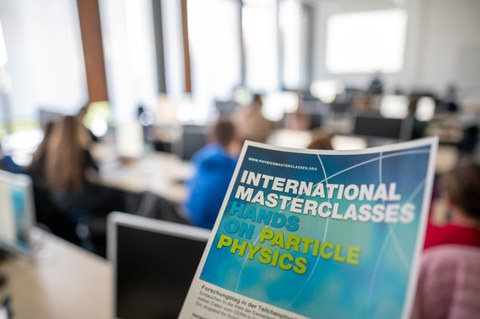Mar 21, 2024
What does it feel like to be a scientist: One day with CERN
Students from all over the world take part in the "International Masterclasses" on particle physics coordinated by TU Dresden. This time, Telavi, Bonn and Rome participated in the session with Dresden.
It was a long day for the students from Telavi, in eastern Georgia. The last part of the "International Masterclasses: hands on particle physics" did not end for them until eight o'clock in the evening, local time. This did not diminish their motivation: they confronted the two moderators Shalini and Tom, who were connected from CERN in Switzerland, with numerous questions, as did their "colleagues" participating virtually from Rome, Bonn and Dresden. This question-and-answer session concluded the annual event, in which school students from all over the world can get insight into international research on particle physics.
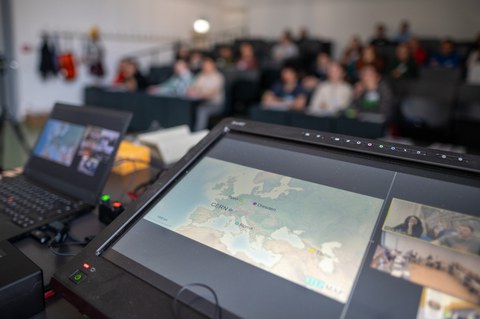
Video conference with participation of CERN, Germany, Georgia, Italy at the end of the Masterclasses
In Georgia, for example, a team from the Georgian Technical University in Tbilisi traveled to Telavi to explain the students who had gathered there the work at CERN in Switzerland, in particular that of the ATLAS particle detector. However, the focus of the group lead by Alexander Sharmazanashvili is not imparting physical knowledge. Rather, it is about conveying the feeling of what it is like to be a scientist. They should get a sense of working with "real data", in a real research context and with the actual possibility of "finding" the Higgs boson. The masterclasses offer such an initial immersion, and some of the students start considering whether they wanted to go into research. Alexander Sharmazanashvili wants to motivate them to do so: In particle physics, they could contribute to great developments, with important effects for society as a whole. Mauro Iodice from the University of Roma Tre also emphasizes this aspect: Many people are not even aware of the positive effects that research at CERN has had on medicine, for example. For him, raising awareness of this is a reason to work with students.
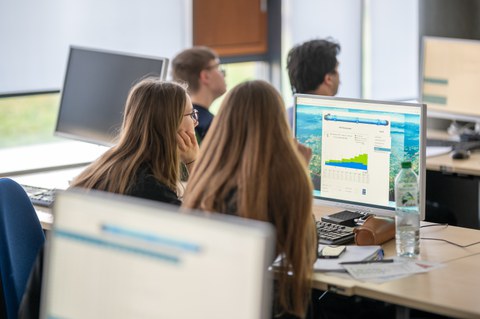
Students working on data from CERN
To that goal, Alexander Sharmazanashvili has obtained the support of the Georgian Ministry of Education, which is now responsible for promoting the program in schools and also provides financial support. Thanks to this support, the masterclasses can now be held in several locations in Georgia, and no longer just in the capital Tbilisi. Neither Alexander Sharmazanashvili nor Mauro Iodice can say exactly how many of the pupils actually decide to study physics and pursue a career in science in the end. Mauro Iodice, who is also a group leader at the Istituto Nazionale di Fisica Nucleare, the largest research center for nuclear physics in Italy and an important partner of CERN, believes that it would be important to track this better. He always finds the students very interested, but also admits that there is still room for improvement in the way the scientific principles are communicated. He would therefore like to discuss attractive teaching methods with the colleagues who organize the masterclasses in other countries - in order to recruit even more students and to ensure that those who do come are all well received.
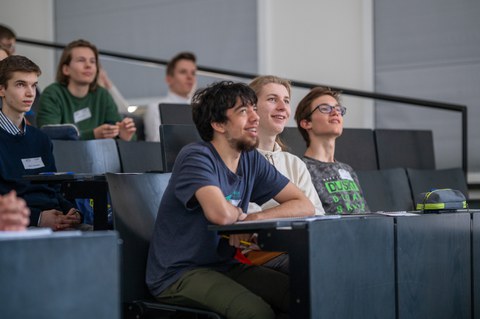
Masterclass participants in Dresden
However, the current offer already seems to be quite good: The network is growing steadily. Over 200 institutions from 60 countries are now involved, with Cape Verde and Mozambique joining just this year. The program, which is co-organized by TU Dresden in the person of Uta Bilow, has started 2005 and is the flagship project of the International Particle Physics Outreach Group, which aims to make international particle physics accessible to young people. To ensure that people from all over the world continue to make discoveries at CERN that are significant for the whole world.
https://ippog.org/imc-international-masterclasses
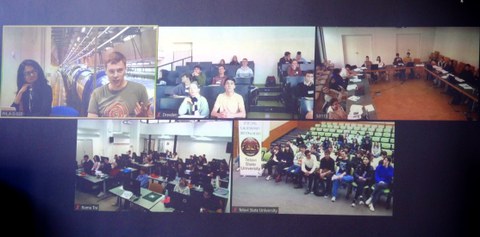
Vivid discussion: CERN, Dresden, Bonn, Rome, Tivali

